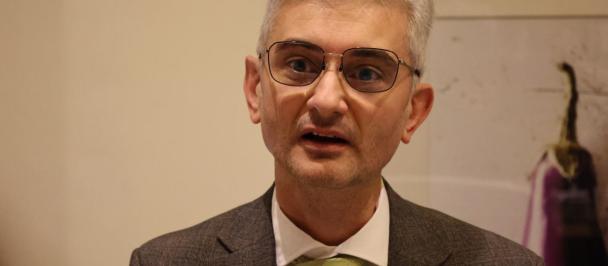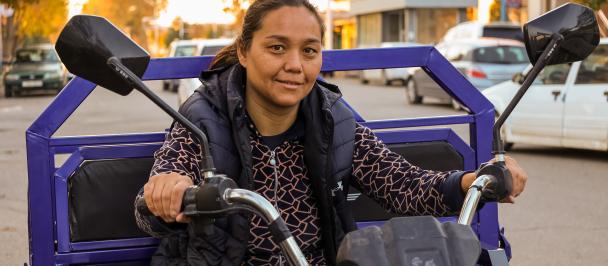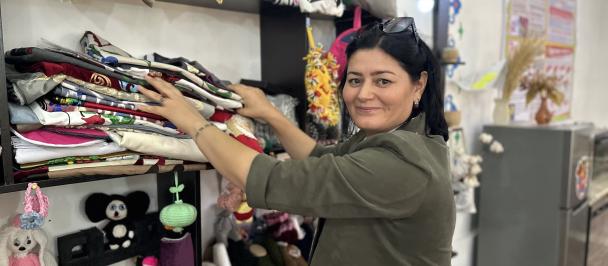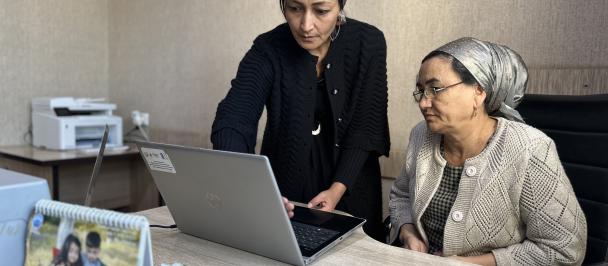
“One day, when we were still married, my ex-husband came home drunk and beat me so hard, that my children woke up screaming. And even now they often wake up screaming at night,” a journalist, who wished to remain anonymous and who was touched by UNDP film Speak Up tells her story. “I was a victim of sexual, psychological, and emotional violence and he also did many things so that I don’t ask for alimony,” adds the woman, who still fears that her now divorced husband might hunt her down if she speaks publicly.
“Speak Up” – a performance-based film developed jointly by UNDP and Rushd Team, - demonstrates the emotional drain and overall damage that victims of domestic violence experience and how social pressure forces them to continue to keep silent. The screening was followed by discussion of the role of media in preventing domestic and other forms of violence.
Domestic violence is a big concern in the whole world and Tajikistan is no exception. According to 2017 health demographic survey in Tajikistan 24 percent of women reported to have experienced physical violence, some starting at the age of 15. About 31 percent of ever-married women said they had been abused by their spouses. Yet, only ten respondents sought help to stop the abuse.
This year UN agencies initiated the EU funded spotlight initiative to support the government of Tajikistan to implement the gender aspect of the National Development Strategy as well as the country’s commitments to the Convention on the Elimination of All Forms of Discrimination Against Women (CEDAW).
“As long as there is a notion that a woman can be punished if she does not obey her husband or her elders and, as long as, families think that women should keep quiet about abuse to keep the family honor, women will continue to be subject to violence, abuse, emotional torture, and rape,” UNDP Resident Representative Dr. Pratibha Mehta says.
“Most women feel that it is their fault that they have been punched … so that is why they don’t talk. So, how we make them talk is also a skill that journalists should have to narrate the story. Keep the confidentiality, but tell the story,” she adds.
Supporting the need for a sensitive and responsible coverage of abuse victims’ and survivors’ stories, Nargis Toymastova, psychologist, highlights the effect that it can have on the further. “The main principle here is to cause no harm,” she says pointing out that women are afraid to speak up for several reasons. One of the main reasons is that they are afraid the consequences of speaking up may be harder to deal with than the abuse itself. Toymastova has had cases, where her patients were isolated and controlled by the abuser in their family so much that they have stopped seeing any sense in living at all.

The law of the Republic of Tajikistan on “Prevention of domestic violence” was adopted only in 2013 and has not yet proven to become a widely used practical tool for protection of abuse victims’ rights. Guljahon Bobosadykova, a civil activist and one of the first authors of the law, says that while she believes the law needs improvements to strengthen the protection level, even in its current state it faces strong resistance from the society in many parts of the country. There is also lack of public awareness about the mere existence of the law and this is where media can help.
The story of the anonymous journalist who has found the courage to speak up at the roundtable, serves as a proof. She says she did not receive proper support either from medical personnel or law enforcement organs that she had appealed to, which left her feeling miserable and powerless.
“I wish my story serves as a warning to someone else to avoid the mistake I have done: I had endured the violence for too long, I should have left much earlier for the sake of my children and myself,” says the woman.
The round-table was organized by UNDP in partnership with the Coalition of Women Journalists.

 Locations
Locations



